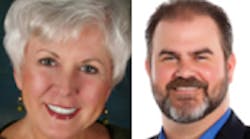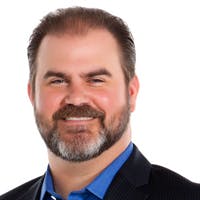Dental school graduation is just around the corner: Start own practice, associate, or go corporate?
As anyone in the dental profession knows, today’s new dentists no longer automatically hang out their shingle and watch patients flow through their door. The factors that have led to these changes are numerous, including a changing economy, dentists working more years instead of retiring, and corporations and group practices becoming more attractive options.
What are the thoughts and insights of some of the pros who have watched this evolution through the years? They’ve had front row seats to the changes, and they’ve had many opportunities to offer their guidance and insights.
DentistryIQ had the opportunity to ask two professionals who are very active in the dental profession a few questions about the sole practitioner vs. group practice or corporation evolution. Jess Webber, CEO of Jameson Management, and Linda Miles, founder of Linda Miles and Associates, offered their takes on the changes, and what these changes mean for the profession.
Q: The big decision facing new dentists today is whether to become an employer in a traditional practice or an employee as an associate or in a corporation. What are some of the trends you’re currently observing with new dentists?
JW: It has been and continues to be a trend for doctors to join a corporate structure right out of dental school. There is a new grassroots trend making its way into the profession that is a mixture of private and corporate that should really be interesting to watch build.
We’ve developed a program to help dentists develop these models. Henry Schein Dental also has a great entrepreneur program called the Dental Business Institute for those interested in building this type of structure. This is when a dentist owns two or more practices in an area. So far it has proven very successful. It gives the new doctor income, flexibility in the work schedule, autonomy, oftentimes the ability to buy in, and a mentor to help. These are branded as private practices and they usually function like traditional private practices. The industry has just recently been able to put a business model together for the standard practice. Many doctors seem to have sorted out that this is a business, while the business is dentistry and taking care of people, the business structure itself and all of the systems can be picked up and moved to a different location.
Q: How long have you been noticing these trends?
JW: The corporate trend since 2001. Most people thought it would fail like previous DSO models, then with the crash in ‘07 it picked up steam. When the economy started picking up, they were everywhere, it was as if no one knew what had happened. The grassroots model as a growing option is more recent. As it tends to be with anything labeled “grassroots,” this concept has been around much longer, but it is just starting to show itself as its own entity by quiet, steady growth.
Q: How do these differ from other trends you’ve observed in the past?
JW:The DSO models in the ‘90s failed due to structure. The current corporate and grassroots models have overcome that, which is what gives them their success. They also fulfill a need that may not have been present in the ‘90s. They’re better structured to operate a successful practice with managed care and insurance.
Q: What do you believe are the reasons for the trends?
JW:I don’t think there is one or even a handful I could point at as the "reasons" for the trends. It seemed to be a perfect storm for the growth and development of the business of dentistry. Insurance, managed care, new doctor debt, banking regulations, new doctors seemingly not wanting to own a practice, time, increased need to know how to run a business, the price of dental practices, values, doctors not selling during the recession, and much more.
I’ve clearly heard many people come up with many reasons! From a generational perspective there seems to be a trend where the value placed on money and time are switching places. Boomers tended to put great value on money. They drove business to be successful at the cost of time, and work often provided an identity. Millennials tend to put more value on time, and work is something they do so they can be who they are. I’m a Generation Xer, and I see myself in a refereeing role. Having spent time with each generation, they really want the same things. The details are always what separate them.
Q: When you work with dentists making these decisions, what advice do you share?
JW:It’s important for them to understand the dental industry, but more important is for them to have an understanding of what they want, where they want to be, what kind of practice they want to own/work in, how they want to raise their kids, and where they want to have a family. There are more options than to own a practice or work for someone. They need to talk with experts and mentors – financial planners, consultants, accountants, distributors, friends, family, instructors, or a dentist. Most people are very interested in helping someone make that crucial correct first step.
Q: What do you think the future holds for dentists as employees or employers?
JW:I think the future is very bright for both, and for those who choose to buy a practice or open one from scratch. There are successful business models for each, and the key is finding the model that works, and then executing it. For corporate and grassroots practices, like every industry, there are good people and companies to work with. I will say that if regulations and mandates continue to grow from the operations and provider side, corporate and businesses with the structure to help adapt and manage those changes stand to fair the best, at least initially.
Q: What do you see as the biggest challenge for recent grads besides being in debt for $250,000 or more at graduation?
JW:That debt alone is not the hurdle. The compounded debt of opening or purchasing a practice, buying a house, etc., is the hurdle. Someone may find themselves $1M in debt quickly, which sounds like a lot of money, and it is, but not over the life of a successful practice. One challenge that I’ve heard others discuss is time – they’re too busy working and studying for the boards to look for a start to their career. They often settle for something, and they don’t really look around to see what’s out there because they started looking in May for something when their residency did not come through. They’re hit with the reality of having to operate a business or work with others, which is not taught in dental school. Working with banks, communicating with team members, and dealing with vendors – these types of interactions are not easy for a new doctor as an employee/associate or owner.
Q: The big decision facing new dentists today is whether to become an employer in a traditional practice or an employee as an associate or in a corporation. What are some of the trends you’re currently observing with new dentists?
LM: Having spoken at several dental schools the past few years and talked to many educators and students, about a third of the class will become an employee or associate of an existing practice, one third will go into a one- or two-year residency or specialty, and one third will go to work for large corporations because the management will be handled by someone else. Most of these offer a decent wage, benefits, and some continuing education opportunities.
Q:How long have you been noticing these trends?
LM: The majority of these trends have slowly taken place since 2005.
Q:How do they differ from other trends you’ve observed in the past?
LM: In the ‘80s, ’90s, and first half of the 2000s, it was not uncommon for dentists to open their own start-up practice, or for two recent grads to go into an ownership or start-up together. With higher debts and more competition, especially in major cities, today, that trend ended eight to 10 years ago.
Q:With the new trends, what do you believe are the reasons for the trends?
LM: The No. 1 reason is school debt, and the No. 2 reason is the pleasing thought of not having to market, manage a business, and train a team while starting a dental career. This has also led to the growth of corporate dentistry.
Q: When you work with dentists who are making these decisions, what advice do you share?
LM: I remind them to think about what prompted them to become a dentist – autonomy, which is lost in several options other than ownership or associating with an option to buy-in. If they’re going to associate with a senior practitioner, my advice is to match philosophical, team management, and business methods with those they associate with. If the working culture is not positive the results will be negative. Some senior dentists are great mentors, and are happy and productive dentists. However, many are burned out and can’t keep staff, and they have financial burdens that are often hidden from a new dentist. Doing due diligence and working with a reputable dental transition firm and dental CPA can make a huge difference in the success of any dental relationship between dentists.
Q:What do you think the future holds for dentists as employees or employers?
LM: As employees – If the match is good, the outcome looks very bright. If the senior dentist wants someone to help but only gives the person the “small procedures” and keeps all the big cases, the younger dentist won’t ever reach maximum productivity and move forward. If the senior dentist is threatened by the younger dentist because patients and the team favor the younger dentist, the results can be negative.
One of the biggest causes of failure for an associate or employee dentist in an established practice is staff sabotage. If the team sees the additional dentist as more work and nothing in it for them, they’ll do whatever they can to create a negative workplace for the newcomer. Rules for the senior dentist, associate, and team must be followed, otherwise this will be a huge issue. A good management consultant during the transition will help get everyone in sync and the systems moving forward to support the new producer. I highly recommend an incentive for the team when the new dentist reaches a certain level of productivity, a win-win for all involved.
As employers – Dentists must invest in their teams if they want the practice to prosper. Due to changes in employment laws in some states, and due to many practices being too large to take a day off, there has been minimum team development the past 10 years. I believe the team makes or breaks a practice. Many of those who are running dental practices had minimal training, yet they’re expected to know how to move the practice forward. To me this is the biggest threat in the profession at the moment. Dentists can be great clinicians, but without an enthusiastic, patient-centered, and well-trained team, the practice will stagnate or decline. Currently 20% of all practices have grown in the past 10 years, regardless of the economy or other obstacles, while 60% are “bobbers” and maintain the status quo. Sadly, 20% of practices are a month away from bankruptcy or not being able to make payroll. They take multiple insurance plans, have poorly trained teams, and have burned out dentists who are tired of working hard for no compensation or personal satisfaction.
Q:What do you see as the biggest challenge for recent grads besides being in debt for $250,000 or more at graduation?
LM: The biggest challenge for recent grads is selecting their next two years’ best work option (residency, military, associateship, start-up, corporate). Fewer senior dentists are selling their practices, working 10 years longer than they were 20 years ago. Recent grads don’t feel equipped to start a practice due to the costs involved and the lack of business management training. They’ve heard negatives about corporations being interested only in keeping shareholders happy, and in being bottom line focused instead of patient focused. Grads also know not all associateships work out well, with a 50% to 70% failure rate the first two years. Residency can add a year or two to their skills, but it also delays earning the power that can start paying down the school loans. The military is an option, but joining determines where the grad will live and practice, which could include going overseas.


